
Map of the major pillars at the front of Masjid-e-Nabwi
The diagram above is a plan view of the front part of Masjid-e-Nabwi and identifies pillars (ustuwaanah) where a significant event or act occurred (the pillars themselves are not important). Note that the position of these pillars was the same as in the time of the Prophet (peace and blessings of Allah be on him).
1. Ustuwaanah Hannanah (the weeping pillar):
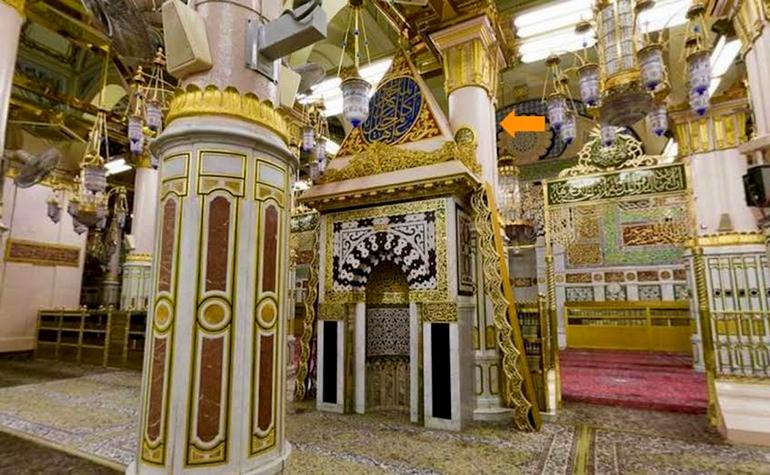
Ustawaanah Hannanah – Photo:Qurancomplex.gov.sa
This is also called the Ustuwaanah Mukhallaq. This is the most blessed of the pillars for this was the Prophet’s (peace and blessings of Allah be on him) place of salah. On this spot there once used to grow a date palm tree. Before the advent of the mimbar, the Prophet (peace and blessings of Allah be on him) used to lean on it while delivering the khutbah (sermon). When the mimbar was made the Prophet (peace and blessings of Allah be on him) used it for the khutbah. It so happened when the change took place, such a bitter sound of weeping was heard from the tree that the whole masjid echoed; and those in the masjid started weeping. The Prophet (peace and blessings of Allah be on him) then said: “The tree cries because the zikr of Allah was near it, and now that the mimbar is built it has been deprived of this zikr in its immediate vicinity. If I did not place my hand on it, it would have cried thus till the Day of Qiyamah.” Afterwards the tree dried up and was buried.
2. Ustuwaanah Sareer:
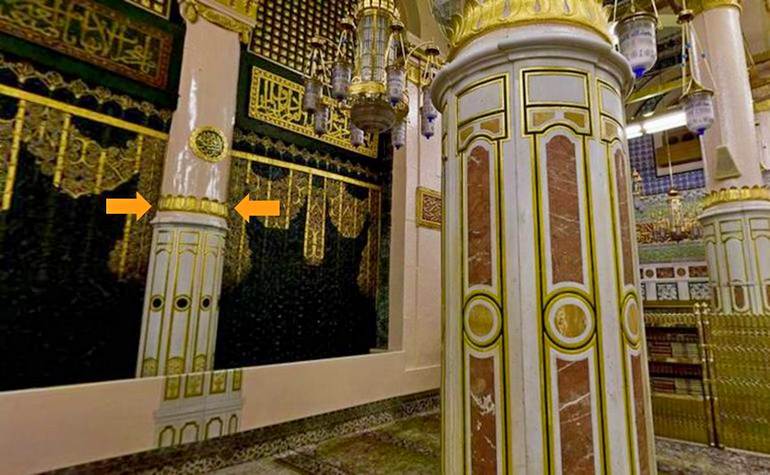
Ustawannah Sareer – Photo:Qurancomplex.gov.sa
‘Sareer’ means sleeping place. It is reported that the Prophet (peace and blessings of Allah be on him) used to make i’tikaaf here also, and used to sleep here while in i’tikaaf. A platform of wood used to be put here for him to sleep on.
3. Ustuwaanah Tawbah:
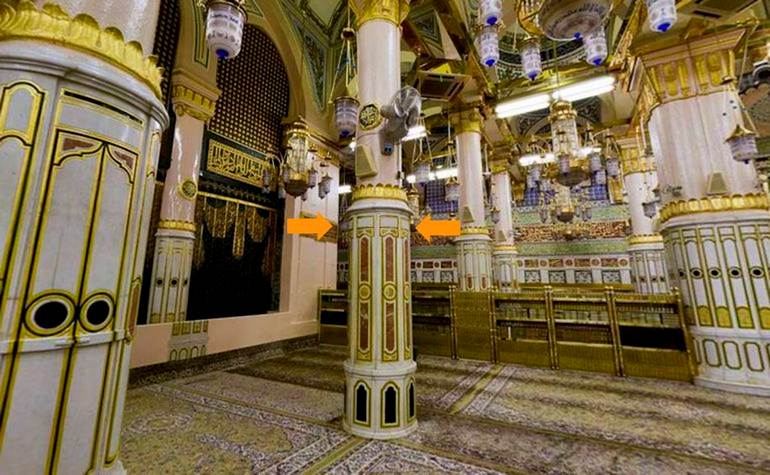
Ustawaanah Tawbah – Photo:Qurancomplex.gov.sa
Also known as Ustuwaanah Abu Lubabah. Abu Lubabah (may Allah be pleased with him) was one of the famous Sahaba. Before Islam, he had much dealings with the Jews of Banu Quraizah. When they acted treacherously during the Battle of the Trench and were taken captive he told them that they were to be killed by making a sign across his throat. After having done that he become so grieved at this indiscretion that he could not rest.
He entered the masjid at this spot where a date-tree used to stand. He bound himself to the trunk saying: “As long as my repentance is not accepted by Allah, I shall not untie myself from here. And the Prophet (peace and blessings of Allah be on him) himself must undo my bonds.” When the Prophet (peace and blessings of Allah be on him) heard this he said: “If he had come to me I would have begged forgiveness on his behalf. Now he had acted on his own initiative, I cannot untie him until his repentance has been accepted.”
For many days he remained tied there, except for salah and the call of nature. At such times his wife and daughter used to untie him and then again tied him to the tree. He remained without food and drink as a result of which his sight and hearing were affected. Then after a few days one morning while the Prophet (peace and blessings of Allah be on him) was in tahajjud prayer in the house of Umme Salamah (may Allah be pleased with him), he received the good news that his tawbah had been accepted. The Sahabah (may Allah be pleased with him) conveyed the news to him, and wanted to untie him but he refused, saying: “As long as the Prophet (peace and blessings of Allah be on him) does not untie me with his blessed hands, I shall not allow anyone else to do so.” When the Prophet (peace and blessings of Allah be on him) entered for Fajr salah he untied him.
4. Ustuwaanah Aisha (may Allah be pleased with her):
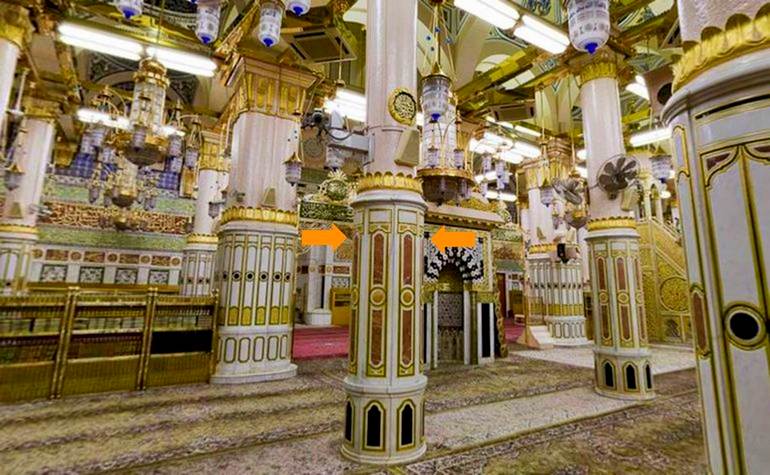
Ustawaanah Aisha – Photo:Qurancomplex.gov.sa
The Prophet (peace and blessings of Allah be on him) used to say his prayers here and afterwards moved to the place at Ustuwaanah Hannanah. It is also called the Ustuwaanah Qu’rah. The reason for this is that Aisha (may Allah be pleased with her) reports that the Prophet (peace and blessings of Allah be on him) said: “In this masjid is one such spot that if people knew the true blessed nature thereof, they would flock towards it in such in a manner to pray there they would have to cast such lots (i.e. Qu’rah).”
People asked her to point out the exact spot which she refused to do. Later on, at the persistence of Abdullah bin Zubair (may Allah be pleased with him) she pointed to this spot. Hence it is called Ustuwaanah Aisha, because the Hadith is reported by her and the exact spot was shown by her. It is a fact that Abu Bakr and Umar (may Allah be pleased with him) very often used to pray here.
5. Ustuwaanah Ali (may Allah be pleased with him):
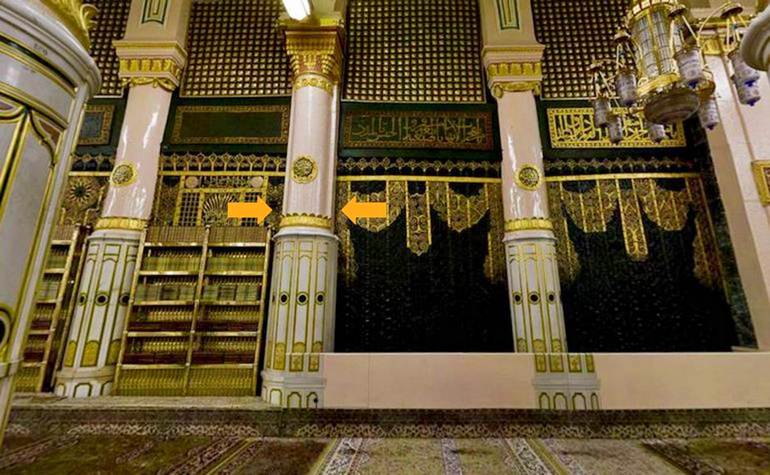
Ustawaanah Ali – Photo:Qurancomplex.gov.sa
Also known as Ustuwaanah Mah’ras or Hars. ‘Hars’ means to watch or protect. This used to be the place where some of the Sahaba (may Allah be pleased with them) used to sit when keeping watch or acting as gatekeepers. Ali (may Allah be pleased with him) used to be the one who mostly acted as such, for which it is often called Ustuwaanah Ali (may Allah be pleased with him). When the Prophet (peace and blessings of Allah be on him) entered the masjid from the door of Aisha’s (may Allah be pleased with her) room, he passed this spot.
6. Ustuwaanah Wufood:
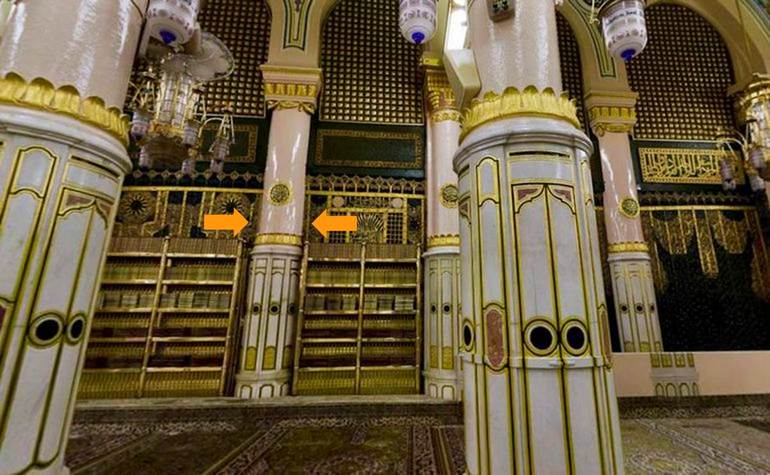
Ustawaanah Wufood – Photo:Qurancomplex.gov.sa
‘Wufood’ means delegations. Whenever deputations arrived to meet the Prophet (peace and blessings of Allah be on him) on behalf of their tribes, they were seated here and here he used to meet them, conversed with them and taught them Islam.
7. Ustuwaanah Jibraeel:
This was the usual place where Jibraeel (upon him be peace) used to enter to visit the Prophet (peace and blessings of Allah be on him). Today it cannot be seen as it lies inside the Sacred Chamber of the Prophet (peace and blessings of Allah be on him).
8. Ustuwaanah Tahajjud:
It is reported that this was the spot where late at night a carpet was spread for the Prophet (peace and blessings of Allah be on him) to perform tahajjud prayer, after all the people had left. It is currently covered by a bookcase but this historic photo shows what exists behind it:
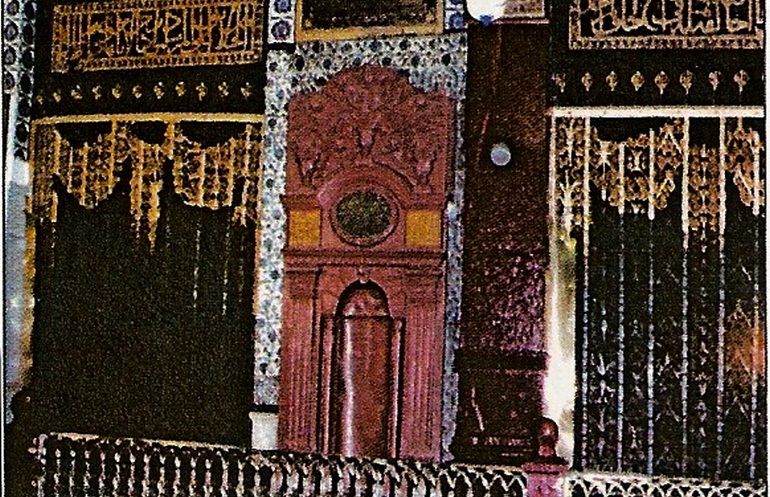
Historic photo of the prayer niche marking the spot
And this is the small mehrab (prayer niche) that also exists inside the Rawdah Mubarak itself:
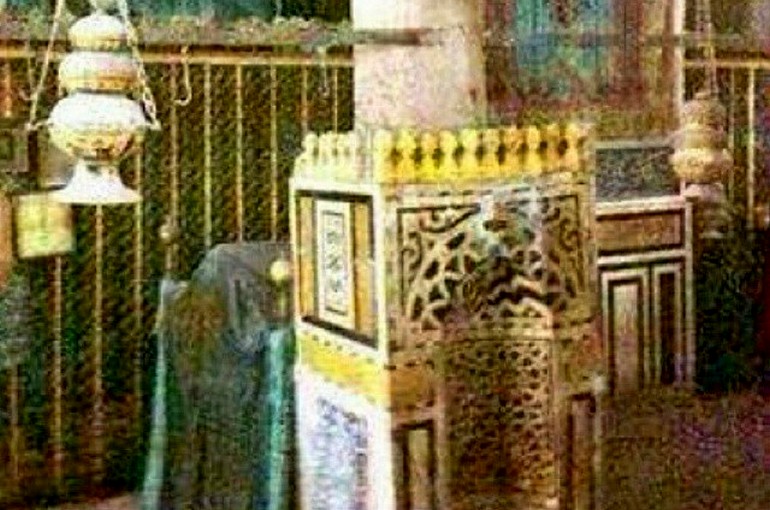
The mehrab inside the Rawdah Mubarak
References: How to perform Ziyaarah – Shaykh Muhammad Saleem Dhorat, Ziyarah & Salawat – Fisabilillah Publications









